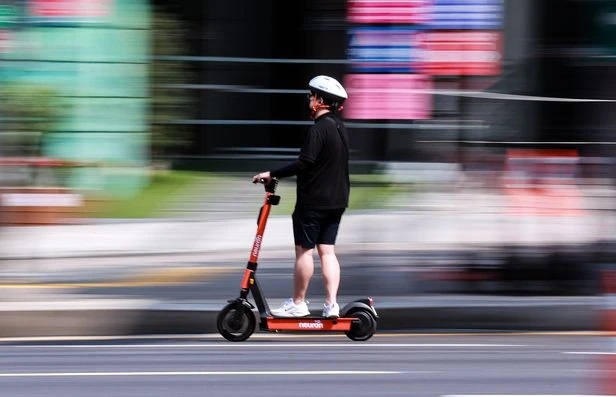[Newsmaker] Once promising testbed, Seoul now a doomed city for e-scooters
Between last-mile mobility innovation and public nuisance, Seoul regulators’ lackadaisical policy a textbook example of how innovation gets killed
By Kim Byung-wookPublished : Oct. 27, 2021 - 16:44

One by one, electric scooter operators are leaving South Korea, once hailed as a perfect testbed for last-mile mobility innovation.
According to industry sources Wednesday, German e-scooter operator Wind, which entered the Korean market in 2019, recently called it quits. Another e-scooter firm Gcooter halted services starting this month in three districts of Seoul -- Yeongdeungpo-gu, Dongjak-gu and Gwanak-gu -- where e-scooters are most frequently towed.
As to why they are packing their bags and leaving, Shared Personal Mobility Alliance, a group of major mobility startups in Korea, criticized the city government’s lackadaisical towing penalty policy, which came on top of a series of perplexing, unpredictable moves to regulate the electric scooter business.
On July 15, Seoul announced that it would tow illegally parked e-scooters for 40,000 won ($34.10) and charge 700 won for every 30 minutes they remain unclaimed.
Nearly three months have passed and some e-scooter operators say their vehicles have been cleared away even though they weren’t parked illegally.
“E-scooters were towed away at the will of towing companies (commissioned by Seoul) without the proper on-site supervision of public officials,” an SPMA official said.
Seoul recently acknowledged that its policy was being abused, but failed to come up with a clear solution. Last month, Seoul spent two weeks inspecting the situation and found some towing companies taking away e-scooters even though they were parked legitimately.
In response, Seoul said it would conduct “regular checks” on towing companies, a half-measure that added frustration to e-scooter operators.
The towing fines e-scooters coughed up from July 15 to late September amounted to 455 million won, according to SMPA.
Illegal parking spaces of e-scooters include driveways, subway exits, 10 meters within bus stations or taxi stands, braille blocks and near elevators for the transportation vulnerable.
E-scooter operators say that the illegal parking issue is just the tip of the iceberg.
Rules that have the potential to make a huge dent in service operators’ customer base have been introduced in a hurried manner, without due consideration of their impact on diverse stakeholders, companies said.
In a typical case, a legislative revision was passed at the National Assembly, after lawmakers hastily went over key details such as the minimum age of riders.
The revision, which came into effect in May this year, mandates electric scooter users to be at least 16 and licensed to drive a motor vehicle. Users must wear protective helmets, and can have their driver’s licenses suspended if they drive e-scooters while intoxicated.
The biggest problem, however, is the oversupply of e-scooters, companies said.
In Korea, an e-scooter business is categorized as “free business,” and anyone can open up their own business by simply registering it with authorities.
As a result, the number of e-scooters in Seoul has spiked in recent years, currently estimated at 55,000 units, but the number of accidents and public complaints has increased as well.
E-scooter operators say Seoul should change the current registration system and base it on those in cities such as Paris, which limits the number of e-scooter operators to three.
Last year, Paris launched an open bidding and selected Lime, Tier and Dott as three operators of e-scooters in the city. Through the open bidding policy, Paris has contained the number of e-scooters to around 15,000.
London, New York and Washington, DC, also select e-scooter operators through open bidding or run a license-based system, keeping the number of e-scooters at 1,650, 3,000 and 17,500, respectively.
The National Assembly is scheduled to pass a personal mobility bill next month, which will require new e-scooter operators to meet certain requirements when they register.
However, industry officials have cast doubts, as the bill doesn’t give cities and municipal governments the direct authority to manage the number of e-scooter operators or their vehicles.







![[Graphic News] More Koreans say they plan long-distance trips this year](http://res.heraldm.com/phpwas/restmb_idxmake.php?idx=644&simg=/content/image/2024/04/17/20240417050828_0.gif&u=)
![[KH Explains] Hyundai's full hybrid edge to pay off amid slow transition to pure EVs](http://res.heraldm.com/phpwas/restmb_idxmake.php?idx=644&simg=/content/image/2024/04/18/20240418050645_0.jpg&u=20240419100350)





![[From the Scene] Monks, Buddhists hail return of remains of Buddhas](http://res.heraldm.com/phpwas/restmb_idxmake.php?idx=652&simg=/content/image/2024/04/19/20240419050617_0.jpg&u=20240419175937)

![[KH Explains] Hyundai's full hybrid edge to pay off amid slow transition to pure EVs](http://res.heraldm.com/phpwas/restmb_idxmake.php?idx=652&simg=/content/image/2024/04/18/20240418050645_0.jpg&u=20240419100350)

![[Today’s K-pop] Illit drops debut single remix](http://res.heraldm.com/phpwas/restmb_idxmake.php?idx=642&simg=/content/image/2024/04/19/20240419050612_0.jpg&u=)